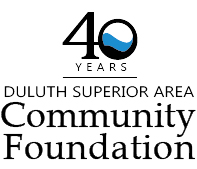Mission
The mission of the Fund for the Environment is to promote livable communities throughout the Lake Superior watershed and northwoods through public education, land use planning, and collaboration. Livable communities are defined as those that prosper economically while conserving natural ecosystems to maintain the region’s high quality of life for future generations.
Goals and Strategies
Goal I: Individually and collectively, citizens will recognize and assume responsibility to maintain the region’s natural resources.
Strategies include:
- Undertake needs assessment to avoid duplication and enhance collaboration among environmental education programs.
- Develop community-wide environmental education projects that increase understanding of ecological and economic value of natural resources and the role of citizens in conservation. This would include a focus on public officials, college students, business leaders, and continuing adult education programs. Wherever possible, projects should be experiential and encourage networking and information sharing.
- Support demonstration projects that increase public awareness about environmental issues and can be replicated throughout the region.
Goal II: Innovative, livable community models will be developed regionally based on land use planning, natural heritage preservation, waste minimization, and green business development.
Strategies include:
- Undertake assessment to determine community planning needs regionwide.
- Help implement Duluth 2001 and assist communities throughout the region to develop and implement comparable vision plans. Projects could include brownfield and urban area reuse and cluster development and support for green business and pollution prevention opportunities.
- Support demonstration projects to conserve natural resources to maintain the area’s high quality of life.
Goal III: Unique collaborations will be created to build consensus and achieve a shared vision among diverse stakeholders.
Strategies include:
- Undertake needs assessment to determine opportunities to creatively resolve community conflict.
- Foster new community leadership and partnerships among citizen groups, public officials, business, and academia to build livable communities.
- Proactively support model processes that anticipate and attempt to resolve issues to strengthen community.
Eligibility
To be eligible to apply for funding, an organization must:
- Be classified as a charitable organization under Section 501(c)(3) of the Internal Revenue Code or classified as an organization under Section 170(c)(1) of the Internal Revenue Code or have a fiscal sponsor classified as a charitable organization under Section 501(c)(3) of the Internal Revenue Code or an organization under Section 170(c)(1) of the Internal Revenue Code
- Be located in or provide service to residents within: Bayfield, Douglas and Ashland Counties in northwest Wisconsin; or Aitkin, Carlton, Cook, Itasca, Koochiching, Lake and St. Louis Counties in northeast Minnesota; or the Bad River Band of Lake Superior Chippewa/Mashkiiziibii, the Bois Forte Band of Chippewa/Atisokanigamig, the Fond du Lac Band of Lake Superior Chippewa/Nah-Gah-Chi-Wa-Nong, the Grand Portage Band of Lake Superior Chippewa/Gichi Onigaming, the Leech Lake Band of Ojibwe, the Mille Lacs Band of Ojibwe or the Red Cliff Band of Lake Superior Chippewa/Gaa-Miskwaabikaang.
Grant range
Up to 5 years of funding of up to $5,000 per year
Application timeline
Fall 2028 Grant Cycle
- Application available August 1, 2028 – October 2, 2028 @ 5:00 pm
- Project begin date: January 1, 2029, or later.
- If awarded, funds would be available in January 2029. Notifications will be emailed at the end of December 2028.


